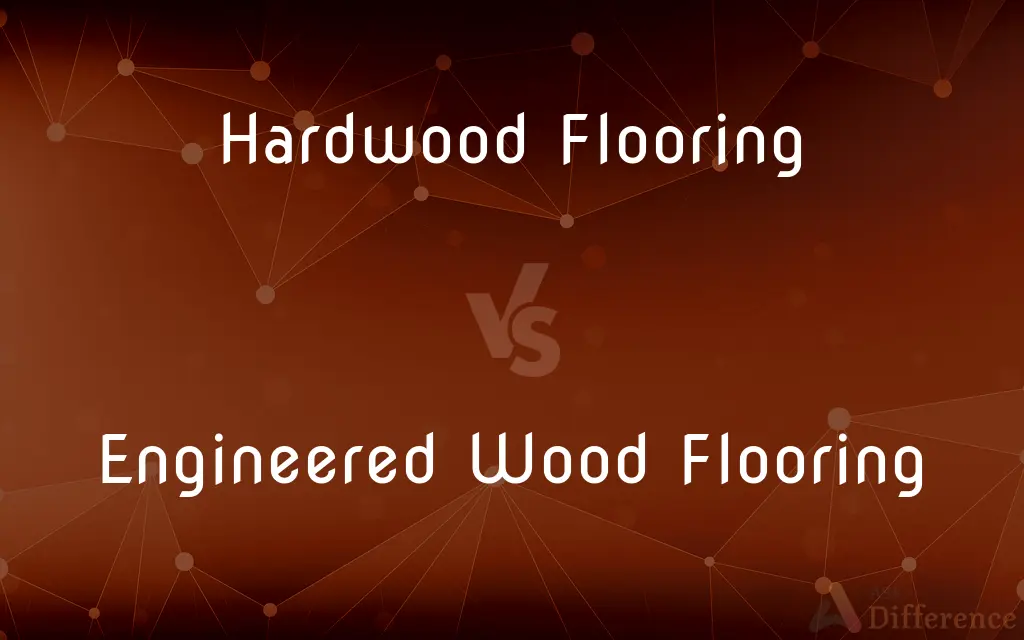Hardwood Flooring vs. Engineered Wood Flooring — What's the Difference?
By Tayyaba Rehman & Fiza Rafique — Published on February 6, 2024
Hardwood Flooring is solid wood throughout, while Engineered Wood Flooring has a real wood top layer and a plywood base.

Difference Between Hardwood Flooring and Engineered Wood Flooring
Table of Contents
ADVERTISEMENT
Key Differences
Hardwood Flooring is made entirely from solid wood planks, cut directly from hardwood trees like oak, maple, or walnut. It offers a timeless, classic aesthetic that can add significant value to a property. Engineered Wood Flooring, on the other hand, consists of a thin layer of hardwood affixed to a base of high-quality plywood, providing a similar look to hardwood flooring but with added dimensional stability.
Engineered Wood Flooring is designed to reduce the expansion and contraction typically seen in Hardwood Flooring due to changes in humidity and temperature. This makes engineered wood a better option for areas with higher moisture levels or fluctuating climates, whereas traditional hardwood floors are best suited for stable, dry environments.
The installation process differs between the two as well; Hardwood Flooring often requires professional installation and can be sanded and refinished multiple times over its lifetime. Engineered Wood Flooring offers more versatility in installation methods, including floating and click-lock, which can be more DIY-friendly.
In terms of durability, Hardwood Flooring can last for generations with proper care. Engineered Wood Flooring also offers considerable durability, but the lifespan is somewhat shorter than solid hardwood, due to the thinner top layer of wood.
The cost aspect shows that Hardwood Flooring tends to be more expensive due to its solid wood composition. Engineered Wood Flooring can provide a cost-effective alternative with a similar aesthetic appeal and functionality, making it an attractive option for many homeowners.
ADVERTISEMENT
Comparison Chart
Composition
Solid wood throughout
Real wood veneer atop plywood layers
Suitability for Moisture
Less suitable for humid areas
Better suited for varying humidity levels
Installation Flexibility
Generally requires nail-down installation
Offers more installation methods
Refinishing Capability
Can be sanded and refinished multiple times
Limited refinishing due to thin wood layer
Lifespan & Durability
Can last generations with proper care
Generally durable but shorter lifespan than hardwood
Compare with Definitions
Hardwood Flooring
Hardwood Flooring refers to floors crafted from dense and durable wood species.
Maple Hardwood Flooring is known for its durability and resistance to wear.
Engineered Wood Flooring
Engineered Wood Flooring is a versatile and durable flooring option with a wood top layer.
The new Engineered Wood Flooring was indistinguishable from solid hardwood but at a lower cost.
Hardwood Flooring
Hardwood Flooring is a natural wood floor surface, treated and finished for durability.
The Hardwood Flooring in the dining area was finished with a high-gloss sealant for protection.
Engineered Wood Flooring
Engineered Wood Flooring consists of a real wood layer bonded to engineered plywood.
The Engineered Wood Flooring in the kitchen withstood heavy foot traffic remarkably well.
Hardwood Flooring
Hardwood Flooring is flooring made from single pieces of solid wood.
The oak Hardwood Flooring added a warm, natural feel to the living room.
Engineered Wood Flooring
Engineered Wood Flooring is a layered product with a wood top and synthetic base.
The walnut veneer of the Engineered Wood Flooring gave the apartment a luxurious feel.
Hardwood Flooring
Hardwood Flooring is a premium flooring option made entirely from natural wood.
The house featured polished Hardwood Flooring that elevated its overall elegance.
Engineered Wood Flooring
Engineered Wood Flooring combines a thin hardwood layer with a plywood core.
The Engineered Wood Flooring was easy to install over the existing concrete floor.
Hardwood Flooring
Hardwood Flooring involves planks milled from a single piece of timber.
The rustic Hardwood Flooring was made from reclaimed barn wood.
Engineered Wood Flooring
Engineered Wood Flooring offers the look of hardwood with enhanced stability.
To prevent warping from moisture, they chose Engineered Wood Flooring for the basement.
Common Curiosities
What is Hardwood Flooring?
Hardwood Flooring is made from solid wood planks, offering natural beauty and durability.
Can I refinish Hardwood Flooring?
Absolutely, solid hardwood floors can be sanded down and refinished several times.
Is Engineered Wood Flooring suitable for basements?
Yes, its construction provides better resistance to moisture and temperature changes, making it a good choice for basements.
Which is more cost-effective, Hardwood or Engineered Wood Flooring?
Engineered Wood Flooring usually offers a more cost-effective solution with a similar aesthetic.
Can Hardwood Flooring be used in kitchens?
Yes, but it's susceptible to moisture damage, so caution and immediate clean-up of spills are advised.
What is Engineered Wood Flooring?
Engineered Wood Flooring features a real wood surface layer on top of engineered plywood, providing stability and a hardwood appearance.
Is refinishing possible with Engineered Wood Flooring?
It depends on the thickness of the top wood layer, but generally, it can be refinished once or twice at most.
What's the lifespan of Engineered Wood Flooring?
Typically, it lasts between 20 to 30 years, depending on the quality and maintenance.
Which flooring is better for pets, Hardwood or Engineered Wood?
Engineered Wood Flooring is often preferred for pets due to its durability and resistance to scratches and dents.
How long does Hardwood Flooring last?
With proper care, it can last for decades or even generations.
Are both types of flooring eco-friendly?
Both can be eco-friendly if sourced from sustainably managed forests, but Engineered Wood Flooring often uses less hardwood.
Is Engineered Wood Flooring easy to install?
Yes, it's known for its ease of installation, including floating and click-lock methods that are DIY-friendly.
Can Hardwood Flooring be installed over concrete?
It's not recommended due to moisture concerns; a moisture barrier would be necessary.
How does moisture affect Hardwood Flooring?
It can cause warping, cupping, or cracking, so it's important to control humidity levels.
Can Engineered Wood Flooring handle radiant heating systems?
Yes, it's generally compatible with underfloor heating systems due to its stability.
Share Your Discovery

Previous Comparison
Vs vs. Or
Next Comparison
Weight Gainer vs. Muscle GainerAuthor Spotlight
Written by
Tayyaba RehmanTayyaba Rehman is a distinguished writer, currently serving as a primary contributor to askdifference.com. As a researcher in semantics and etymology, Tayyaba's passion for the complexity of languages and their distinctions has found a perfect home on the platform. Tayyaba delves into the intricacies of language, distinguishing between commonly confused words and phrases, thereby providing clarity for readers worldwide.
Co-written by
Fiza RafiqueFiza Rafique is a skilled content writer at AskDifference.com, where she meticulously refines and enhances written pieces. Drawing from her vast editorial expertise, Fiza ensures clarity, accuracy, and precision in every article. Passionate about language, she continually seeks to elevate the quality of content for readers worldwide.
















































